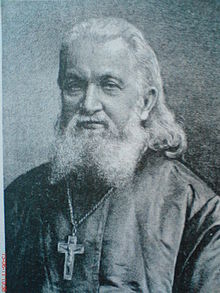Russophile Movement in Galicia
The Russophile movement in Galicia was a cultural movement among the Ruthenians (Eastern Slavs) of the Habsburg Monarchy . The Russophile representatives propagated the fact that the Ruthenians belonged to the all-Russian people and emphasized the common cultural ties with the Russians that have existed since the Kievan Rus era . One of the goals of the Russophile movement was the maintenance of the East Slavic identity and the return to Russian Orthodox Christianity instead of the link to Catholicism imposed in the Union of Brest .
The Austro-Hungarian authorities viewed the Russophile movement in Galicia, Transcarpathia and Bukovina with great suspicion and supported the Ukrainophile movement among the Ruthenians as their counterweight . This propagated the greatest possible distance to the Russians (which was not least reflected in the newly chosen ethnonym) and was very loyal to the Habsburg monarchy. The Ukrainophile movement was also supported by Polish circles.
After the outbreak of World War I , many leading intellectuals and supporters of the Russophile movement were subjected to severe reprisals by the Austrian government. Many of them died in the internment camps Thalerhof and Theresienstadt , others fled with the retreating Russian army after it had conquered Galicia in the meantime. As a result, the Russophile movement in Galicia was marginalized and had little influence. The end of the Russian monarchy and the seizure of power by the Bolsheviks in Russia also led to the crisis of the predominantly conservative movement .
The leading figures of the Russophile movement included:
- Anton Beskid (1855–1933) - legal scholar and politician
- Bohdan Didyzkyj (1827–1909) - writer and journalist
- Adolf Dobrjanský (1817–1901) - politician and writer
- Ivan Franko (1856–1916) - Ukrainian writer and socialist, supporter of the Russophile movement in his youth
- Jakiw Holowazkyj (1814–1888) - poet, historian, publicist, rector of Lviv University
- Ignatij Hudyma (1882–1944) - Orthodox priest
- Jossyp Losynskyj (1807–1889) - ethnographer, priest, writer
- Ivan Naumowytsch (1826–1891) - writer and publisher, journalist, Uniate (later Russian Orthodox) priest
- Antonij Petruschewytsch (1821–1913) - historian, linguist, ethnographer
- Isidor Sharanevich (1829–1901) - historian and archaeologist
- Denys Subryzkyj (1777–1862) - historian and ethnographer
literature
- Малкин В. А., Русская литература в Галиции. Львов: Издательство Львовского университета, 1957.
- Пашаева Н. М., Очерки истории Русского Движения в Галичине XIX — XX вв. / / Гос. публ. ист. б-ка России. - М., 2001.
- Москвофільство: документи і матеріали / Львів. нац. ун-т ім. І.Франка; Вступ. ст., комент. О.Сухого; За заг. ред. С. А. Макарчука. -Lьвів, 2001.
- Wendland, Anna Veronika (2001) The Russophiles in Galicia. Ukrainian Conservatives between Austria and Russia, 1848–1915. Publishing house of the Austrian Academy of Sciences (VÖAW), Vienna, 2001. 624 pages. ISBN 978-3-7001-2938-7
